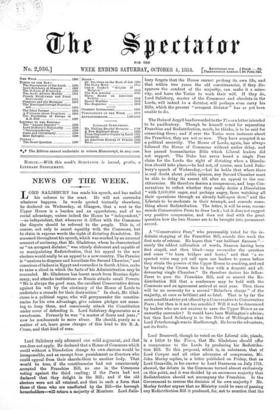Lord Salisbury only advanced one solid argument, and that one
does not apply. He declared that a House of Commons which could without a Dissolution change its own electors would be irresponsible, and as exempt from punishment as directors who could appeal from their shareholders to another body. That would be true, if the constituencies had not unanimously accepted the Franchise Bill, no one in the Commons voting against the third reading ; if the Peers bad 'not declared that they delight in the Bill ; and if the old electors were not all retained, and that in such a form that those of them who are unaffected by the Bill—the borough householders—will return a majority of Members. Lord Saha- bury forgets that the House cannot prolong its own life, and that within two years the old constituencies, if they dis- approve the conduct of the majority, can make it a mino- rity, and leave the Tories to work their will. If they do, Lord Salisbury, master of the Commons and absolute in the Lords, will indeed be a dictator, will perhaps even carry his Bills, which the present "arrogant dictator" has as yet been unable to do.














































